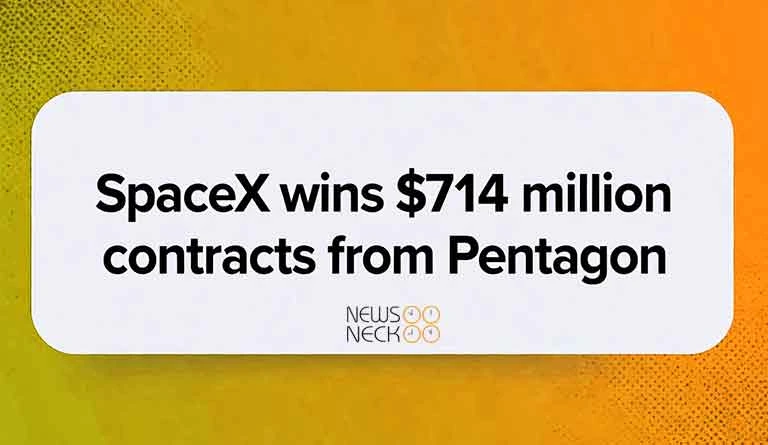SpaceX Secures $714 Million in Pentagon Launch Contracts
In a significant move that underscores the deepening partnership between the U.S. military and the private space industry, the Pentagon has awarded Elon Musk’s SpaceX the bulk of its latest batch of high-priority launch missions, contracts worth $714 million. The decision reinforces SpaceX’s position as the go-to provider for national security launches, while a rival space company, Jeff Bezos’ Blue Origin, continues to wait in the wings.
The U.S. Space Force announced the awards on October 3, assigning five out of seven missions to SpaceX under its National Security Space Launch (NSSL) program. The remaining two launches, valued at $428 million, went to United Launch Alliance (ULA), a joint venture between Boeing and Lockheed Martin .
These contracts are part of a massive, multi-year program designed to ensure the U.S. military can reliably get its most critical satellites into orbit. “Space is the ultimate high ground, critical for our national security,” said Col. Eric Zarybnisky of the U.S. Space Systems Command. “Delivering assets to the warfighter is our ultimate mission, and we rely on strong government-industry partnerships to achieve that goal” .
The Winning Missions
The newly assigned missions cover a range of military and intelligence objectives, with many details shrouded in secrecy. SpaceX’s five launches, scheduled for as early as 2027, include a mix of communications, reconnaissance, and classified payloads .
The specific missions awarded to SpaceX are:
- USSF-206: This launch will carry the 12th Wideband Global Satcom (WGS) satellite, a powerful communications spacecraft built by Boeing to bolster global military communications .
- USSF-155, USSF-149, and USSF-63: These three missions are for classified Space Force payloads. Public details are scarce, underscoring their sensitive nature .
- NROL-86: A reconnaissance satellite for the National Reconnaissance Office (NRO), the government agency in charge of designing, building, and operating U.S. spy satellites .
ULA, meanwhile, will launch USSF-88, which carries a next-generation GPS satellite, and NROL-88, another classified NRO payload .
You May Read it: Apple’s $108 Billion Crash
A Growing Lead in the Space Race
This latest award is the second round under the current Phase 3 contract and continues a pattern of SpaceX dominance. In an earlier round announced in April for fiscal year 2025, SpaceX won seven of nine missions .
The following table breaks down the competitive landscape:
| Company | Missions Awarded (FY2026) | Total Value | Key Rocket | Status |
|---|---|---|---|---|
| SpaceX | 5 out of 7 | $714 million | Falcon 9 / Falcon Heavy | Certified, active |
| United Launch Alliance (ULA) | 2 out of 7 | $428 million | Vulcan Rocket | Certified, active |
| Blue Origin | 0 | Not applicable | New Glenn Rocket | Awaiting certification |
Analysts note that the price difference is notable. SpaceX’s five missions average about $143 million per launch, while ULA’s two missions come in at $214 million each . This price difference is partly explained by the fact that four of SpaceX’s five missions will require its heavy-lift Falcon Heavy rocket, a more powerful and expensive vehicle .
You Might like it: Elon Musk xAI Envisions Edge
Blue Origin’s Wait for Certification
A key part of the story is who didn’t get a contract. Blue Origin was selected as a third provider for the NSSL Phase 3 program back in April but has not yet been assigned any missions because its New Glenn rocket has not completed the required certification process for national security launches .
“No missions were assigned to the third provider, Blue Origin, which has its next opportunity for a mission in FY27,” Space Systems Command said in a statement . The company’s near-term fate in the military launch program hinges on the success of its upcoming missions, including a NASA mission to Mars expected later this fall. A successful launch would be a major step toward securing the necessary certification .
The Bottom Line
The U.S. government is deepening its reliance on private companies to access space. With this $714 million award, SpaceX further cements its lead in this high-stakes arena, tasked with launching the eyes, ears, and communication links vital to American defense. As the space industry continues to evolve, the partnership between the Pentagon and these commercial entities is set to define the next generation of national security in orbit.
Author: Junaid Arif
Date: 8 Oct, 2025
For More Updates, Visit Newsneck













